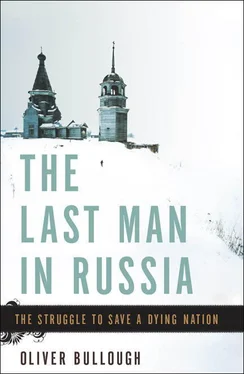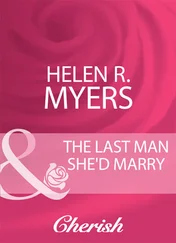And the second woman interrupted: ‘It was like the earth opened.’
Ksenia confirmed that: ‘Yes, it opened, and I began to, I’m talking about myself, I began to grow. There were all these discussions, that went deeper, deeper, deeper.’
Another woman, with a drawn middle-aged face, a few strands of hair falling out of her headscarf, stepped towards me. It was not easy to approach because of the narrow paths between the graves, but she was determined. She wanted, she said, to tell me her story.
She had been married, she said, only a short time when her husband began to drink. He drank vodka every day, and came home staggering and violent. All her attempts to stop him had come to nothing, and her life was horrible. That was when she met Father Dmitry.
‘I saw him, and, how to say, he was like, he shone, he glowed with light, you could shut your eyes and see him; this was love, he glowed with love. He was white-haired, his hair was all like this,’ she said, waving her hands around above her head with a broad smile. She had met him, she said, in the late 1980s when Father Dmitry was holding prayer meetings at which he made lists of the people present and made them promise not to drink. It was the dam he erected against the vodka engulfing the country and the misery engulfing himself.
‘I want to tell you what happened with me,’ she said. ‘So listen. When I went to him, I wrote down my question, and he used to answer all the questions that we wrote down. I used to go there, and it became winter, and it was dark and my son said he could not let me go alone, and would come with me to escort me. I said to him that he needed to relax, that he was always working, that he came home late, that he could not come, but he said he wanted to come with me. And he started to come too, and I said to the priest: “I don’t drink but my husband drinks and I have come for him. I want you to write him down on your list.”’
Father Dmitry refused, saying that her husband had to come himself to pledge sobriety. She went home and begged and begged her husband, but he refused and refused.
‘Until one beautiful day I asked him and he agreed. This was like a miracle. We get to the train station, he doesn’t turn back. We get to the bus stop, he doesn’t turn back. He gets to the library and he doesn’t turn back,’ she said, her eyes gleaming.
They had sat at the back of the library where Father Dmitry held his meetings, and she had gripped her husband’s hand. He was distrustful of the gathering, as if it was some kind of cult.
‘He swore at everyone, using all these swear words. Do you know these words in Russian? Yes? Well, he was using them all. The believers understood it was not him speaking, that evil was speaking. He swore, he was swearing, and he said he could not stand it. He said that he had had it up to here. And I’m being quiet, and not saying anything – let him swear.’
Father Dmitry came up to her husband and looked at him: ‘I will give you five years. Five years. Five years not to drink.’
Her husband said: ‘I can’t survive.’
‘You will survive.’
‘I won’t survive.’
‘You will survive.’
‘Father,’ he said, ‘I will drink.’
‘No, you won’t.’
‘I have drunk for twenty years. What have I not drunk? Anything that burns I’ve drunk. I will drink.’
‘No, you won’t.’
She laughed a beautiful musical laugh, and her face had dropped a decade or more. She looked young: ‘The priest was like this, and my husband was like that.’
Two times Father Dmitry said with such certainty: ‘No, you won’t.’
They went home, and her husband calmed down and no more was said about it.
‘Then the next day my husband left to go to work, and to think that my husband after twenty years could come home from work sober. What a thought. The time comes. It’s four, five, and I’m waiting, and everything’s shaking inside, could it be possible? I wasn’t worried that he would drink, of course he would drink, he always drank, but that he would go against God. This was very important to me, it was like a sin. I was thinking about how I had forced him to commit a sin. Five o’clock, six o’clock, seven o’clock. And he appears,’ she paused for dramatic effect, loving her story.
‘And I look at him. And he’s sober. Sober!’
Her husband had told her an incredible story: ‘The bus broke down, we stopped on a bridge, the lads ran off and bought some wine, and said, “Seryoga, pour it out,” and I said, “I do not drink.” And they said, “What?” And I said, “I do not drink. I went to a priest, and the priest gave me five years of no drinking.” They gave me a glass, but I said no.’
The woman laughed with joy.
‘He said no. No! And he’s been like this ever since. Ever since. It was a miracle. It is a miracle. A miracle. Father Dmitry saved him. He wanted to save the whole Russian people like that, one at a time. That was what I wanted to say. God bless you.’
For my demographic data I have relied on the website of Russia’s Federal Service of State Statistics ( www.gks.ru), which publishes figures at fascinating levels of detail. I have used the monthly figures (which tend to show a lower total), rather than the census data, mainly because they allowed me to follow changes over small periods of time in very specific places, which is crucial to how I came up with my ideas. I have used www.mortality.org, for reliable life-expectancy and other statistics.
I have used and appreciated Russia’s Peacetime Demographic Crisis by Nicholas Eberstadt (Washington, DC, 2010). He seems to make a good case, but I have also followed the online discussion about whether he has gone too far in his gloomy prognostications.
I have used newspaper archives in London and Moscow, as well as periodicals from elsewhere, for contemporary views on Dmitry Dudko. Among the most useful have been Russkaya Mysl (Russian Thought , 8 March 1979; 12 April 1979; 29 February 1980), the Keston News Service (26 June 1980), Khronika Tekushchikh Sobytii (the Chronicle of Current Events , multiple issues, available on www.memo.ru), The Times (of London, multiple issues), the New York Times (multiple issues) and those papers included in Google’s mercifully digitized news archive.
I have scoured the libraries of Moscow and London, and corresponded with libraries further afield, in an attempt to find everything ever written by Dmitry Dudko. He was a prolific writer, so this has not been easy. I never found a copy of Vrag Vnutri (Frankfurt, 1979) but, otherwise, I am confident I have read the vast majority of his work. Here is a list of the books and articles that most informed this book.
Our Hope (New York, 1977) is the English translation of O Nashem Upovanii (Paris, 1975).
Podarok ot Boga (A Present from God , Moscow, 1997) is the closest thing he wrote to an autobiography.
The Collected Works published by the Moscow Patriarchate (Moscow, 2004) include in Volume 1: ‘Vernost v Malom’ (‘Faithful over a Few Things’); ‘Poteryannaya Drakhma’ (‘The Lost Coin’); ‘Vyyavlenie Iskusnykh’ (‘Exposure of the Skilled’). Volume 2 contains: ‘Na Skreshchenii Dorog’ (‘At the Meeting of the Roads’); ‘Kak Istolkovat Pritchi’ (‘How to Interpret Parables’); ‘Propoved Cherez Pozor’ (‘Preaching through Shame’). Volume 3 contains: ‘Khristos v nashei Zhizni’ (‘Christ in our Life’); ‘Liturgiya na Russkoi Zemle’ (‘Liturgy on Russian Land’); ‘V Ternie i pri Doroge’ (‘Among the Thorns and along the Wayside’).
I pieced together his self-published newspaper V Svete Preobrazheniya (In the Light of the Transfiguration) from an unpublished collection in the Russian State Library; from the Vestnik Russkogo Khristianskogo Dvizheniya (Bulletin of the Russian Christian Movement , no. 127, 1978 and no. 129, 1979); from Volnoe Slovo (Free Word , no. 33); and from ‘Propoved Cherez Pozor’ in the Collected Works .
Читать дальше












